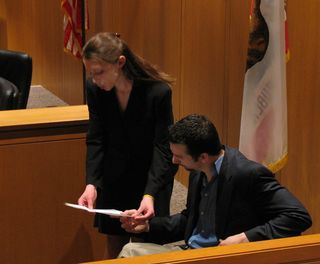
Forensic Psychology
Forensic Psychology: Exciting New Career Opportunities
The field of Forensic Psychology offers many new career opportunities.
Posted November 18, 2015
I (Jonathan) have been a faculty member in psychology at the University of Kentucky for over 27 years, and one of the most interesting things I have noticed over this time is the increase in interest in forensic psychology (i.e., applying the science and profession of psychology to law and the legal system). Almost every week a student will approach me to ask about a career in forensics. It’s hard to know why I get so many queries. I’m sure it's partly because I teach courses related to the topic and that students know my research interest is in legal decision making. However, I believe that it is highly likely that I get these questions because the field of forensic psychology has grown so much over the years. This growth, partly spurred by an amazing amount of media exposure (from Law & Order to Forensic Files) has led to individuals seeking out careers in forensic psychology.
Before going too far with discussing careers in forensic psychology, it is critical that I make clear that there are two ways to think about forensic psychology:
Narrow definition: The application of clinical specialties to the legal arena with an emphasis on the application of clinical skills such as assessment, treatment, evaluation to forensic settings (e.g., clinical profiling, insanity cases, competency to testify in court, child custody and family law, mediation and dispute resolution, threat assessment, law enforcement selection, expert testimony in court, child abuse investigations, provide treatment to inmates).

Broad definition: Applying research and experimentation in areas of psychology other than clinical psychology (e.g., cognitive psychology, social psychology) to legal issues (e.g., eyewitness testimony, jury decision making, expert testimony in court).
Thus, not all forensic psychologists are clinicians and that there are a lot of opportunities in forensic psychology that do not involve clinical psychology. I will add that forensic psychologists work in a variety of contexts: in local jail, state and federal prisons, rehabilitation centers, police departments, courthouses, law firms, schools, government agencies (including the FBI), private practices, colleges and universities, and research institutes.
Now let me give you two pieces of advice to start thinking about actually moving into the field of forensic psychology. First, keep in mind that if you want to actually call yourself a “forensic psychologist” you need to understand that this title is really only for those who get an advanced degree, such as a Ph.D. Second, it is extremely rare that you will be able to major in forensic psychology as an undergraduate. There are a few schools with such a major, but it is almost surely the case that you will just major in psychology. I will add that it is possible for you to major in criminal justice or criminology. You might even major in sociology with a concentration in criminology. Remember, however, that even if you do not have a degree in one of these majors, it might still be possible to get a job in a field related to forensic psychology.

In future posts, we will discuss the specific careers paths you might consider with various levels of college degree. You will learn that there are jobs you can get that are related to forensic psychology and that require only a Bachelor’s degree. With regard to jobs that require an advanced degree, we will cover those, too. We will also cover specific steps you will likely need to take to stay focused and move forward with your forensic psychology career goals.
Please note that the comments of Dr. Golding and the others who post on this blog express their own opinion and not that of the University of Kentucky.
Want more?
Check out our website to explore more career opportunities in psychology
Click here to read Dr. Golding's blog on how to succeed in college.

